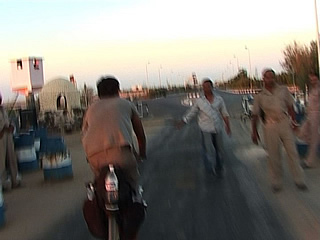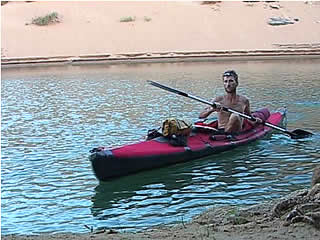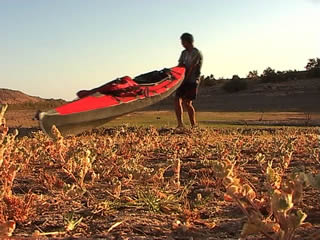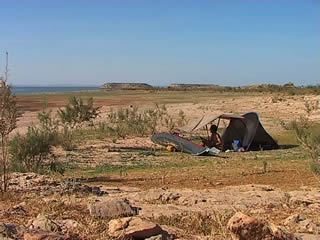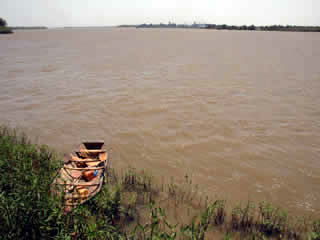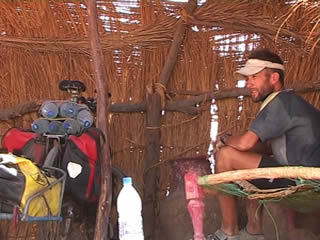« May 2007 | Main | July 2007 »
June 25, 2007
The Last of the Checkpoints? - Arrival Aswan
Click on image to play video (high speed connection advised)LOCATION: Aswan, Egypt
SEE WHERE WE ARE!
Longitude: N:24deg.05'54.
Latitude: E: 032deg.54'01.
Kms from Djibouti: 3,417
Individual travel across the 287 km. of desert between Abu Simbel and Aswan is not permitted by the Egyptians. Foreigners are only permitted to travel in tour buses in police convoys that leave once a day. Our request to secure permits from both the Tourist as well as the Aswan Police was denied after much time spent at the offices of both agencies. With no alternatives available we were going to have to ride and try our luck along the way.
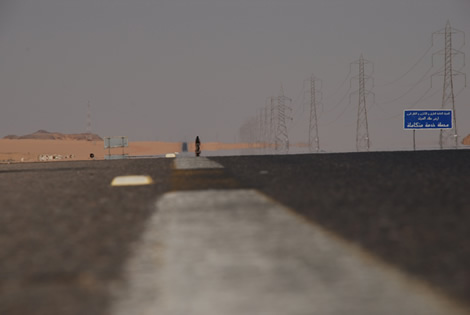
I met up with Jason in Aswan where he was brought and released by the authorities after being arrested trying to paddle back to Sudan across Lake Nasser. We took the bus to Abu Simbel arriving at 8:30 pm where we were able to convince the policeman who questioned us while we were unloading the bikes that we were going to be staying in town. The major attraction in Abu Simbel is the temple complex of Ramses II which was relocated here with the construction of the Aswan High Dam. At the entrance to the temple are four colossal statues each 20 metres high.
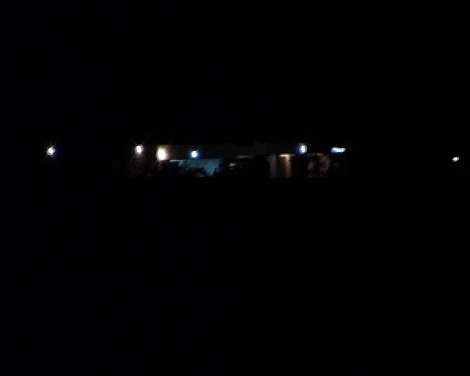
Checkpoint # 1 - Abu Simbel
Our journey from Abu Simbel would involve crossing two checkpoints within the first 50 km. Leaving at night was attractive because biking would be easier with the cooler temperatures and darkness was our best option of skirting these checkpoints. We set of around 10:30 and saw the lights of the first checkpoint around midnight. We detoured across the desert to go around it: two shadowy figures silhouetted by the moon against the sand silently gliding past as quietly as possible. The sand was soft in sections making it difficult to walk as well as push the bike. The voices from the post were loud and clear and it almost felt like a scene from the movies. A bright lit checkpost with guards and lots of noise. Two silent operatives silently getting past without anyone noticing.
The second post at Toshqa 40 km away was reached at 3 am. This checkpost was situated a hundred yards from a T-junction. We didn't see any lights so assumed that everyone was asleep. The exception being an off duty policeman in his uniform outside his house who saw us but didn't seem terribly interested. There was a small settlement around with lots of dogs who were all barking loud enough to wake the dead. The checkpoint was dark and we decided to ride through. After crossing the canal a few km. down the road we found a spot in the desert to sleep. Sleeping on the dunes in the desert underneath millions of stars was a very memorable experience.
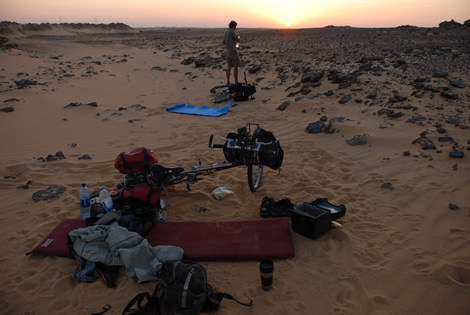
Desert Camp
Riding the next morning was challenging. We left at 8 am. It was already very hot and riding was difficult with temperatures around 45-50 celsius. We arrived at a small little hut selling colas and chips around noon very fatigued and rested here till the evening. The next hut was a 100 km away so continuing wasn't an option. This is a very lonely stretch of road across the desert where not much survives.
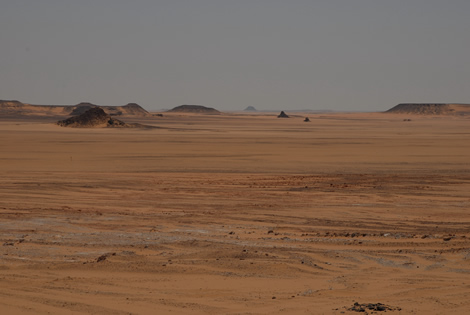
We were going to cross the last and final (or so we thought) checkpoint during daylight hours at 7 pm and the plan was to ride through it without stopping with Jason filming from behind as we rode through. We were only 15 km. from Aswan and we didn't think they would send us back to Abu Simbel. As we went past a policeman put his hand out motioning us to stop but we ignored him and continued.
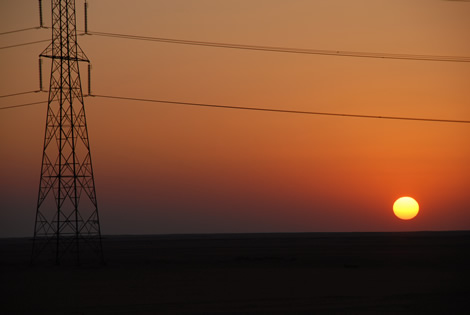
Assuming that we were done with the hard part and with a little bit of daylight to spare we took a brief excursion to see the Aswan high dam. The downhill to Aswan from the high dam was welcome news to the legs. However there was one final hurdle to cross which we hadn't anticipated. The Old Aswan Dam built by the British in 1902 crosses the Nile outside town. The military control access to the bridge across the dam and insisted that only vehicular traffic was allowed across the bridge and therefore the only way to cross would be to load the bikes on a pickup truck. Walking or biking across the dam wasn't permitted. We spent almost 2 hours arguing with the guards to let us bike across and insisted that we were prepared to camp out there for as long as it took. The officer Lt. Afari, who was called to figure out what all the fuss was about, pointed out that even President Hosni Mubarak wouldn't be allowed across on a bike. The exchange then got increasingly heated with Jason and I accusing the officer of gross incompetence and lack of initiative on his part in finding a solution to the problem, and Lt Afari accusing us of attempted bribery (we'd actually offered to pay for an escort, which was interpreted wrongly). Then somehow in the midst of all the back and forth an agreement was reached: he riding in a car with us following behind. We thanked him for his solution (that we'd suggested 2 hour previously) and pushed on to complete the final few kms to Aswan.
sher
** MOKSHA SHIPPING TO EUROPE FUNDING DRIVE **
> Total to raise: $4,500
> Total raised to date: $4,700
> Total still to raise: $0
Sincerest thanks to the following for your pledges -
- "We didn't want to be forgotten", UK, $550
- Keith Jacko, USA, $50
- The Speed Family UK, $150
- Karen Bossen, USA, $50
- Wendy Bumgardner, USA, $50
- Will Waller, Dublin, $100
- Casey Dunn, USA, $100
- Anonymous, USA, $250
- The Sheltons, UK, $1,000
- Michael Rawlings, UK, $50
- Crister Brady, US, $50
- Karl Kaseoru, US, $500
- John and Bridget Maxwell, UK, $50
- Jennifer Mackenzie, US, $50
- Ian McCormick, UK, $200
- Terry Mason, California USA, $200
- Jackie and Jean Bernard, Djibouti, $250.
- Erden Eruc and Nancy Board of Around n Over, Seattle USA, $250
- Sharon Kessler, Colorado USA, $500
- Jane Koca, San Jose USA, $50
- John Caldwell, San Jose USA, $100
- Greg Kolodziejzyk of Pedal the Ocean, Canada, $250
Posted at 8:14 PM
June 21, 2007
Arrested at the Border - provisional update
LOCATION: Abu Simbel, Egypt
SEE WHERE WE ARE!
Longitude: N:22deg.19'50.
Latitude: E: 031deg.36'53.
Kms from Djibouti: 3,313
If I was asked to write a fictional account of the last few days I would be hard pressed to make it any more of a bizarre and twisted story that it was in real life. I am currently writing as a free man in Abu Simbel, about to head north by road to Aswan with Sher who has just joined for 2-weeks of biking to Cairo. But 48 hours ago it was a very different story: I was sitting in a military detention centre being interrogated by Army Intelligence, separated from my equipment and facing espionage charges with a potential prison sentence of 40 years in a military prison.
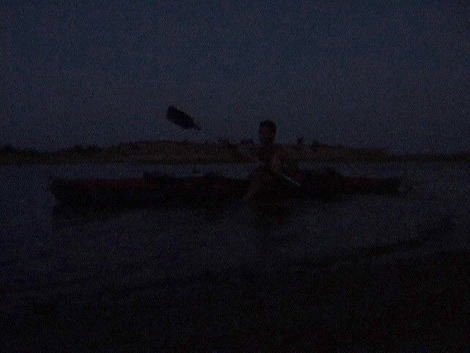
Paddling for the Border - Sudanese side
I was actually caught on the return journey back to Sudan (in order to secure an exit stamp before taking the ferry to Egypt - the authorities both sides of the fence being none the wiser as to what I'd really been up to) having reached Abu Simbel successfully after paddling for two nights through the demilitarized buffer zone between Sudan and Egypt. I was apprehended and overpowered by local fishermen who turned me in (no doubt for a hefty back-hander).
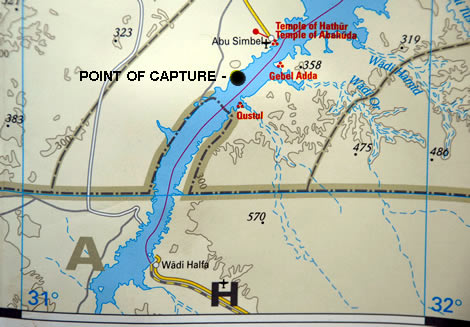
During the ensuing interrogations I was asked to explain all the electronics equipment I was carrying: satellite phone, highspeed Rbgan satellite terminal,
laptop, video and digital still cameras, GPS, EPIRB, etc, etc. Basically they didn't buy my story of being on an expedition. The two passports didn't help. And then they started going through my photos and video footage, all taken at night of course and detailing positions on the GPS as well as the border observations posts (lit by artificial lights) on the lake shore, and other areas within the border zone deemed sensitive, things started looking very had indeed. It was at this point that I'd given up all hope of finishing the expedition, either through the Middle East or via Pakistan and India, and I was seriously considering the prospect of spending the rest of my life in an Egyptian prison. Not good.
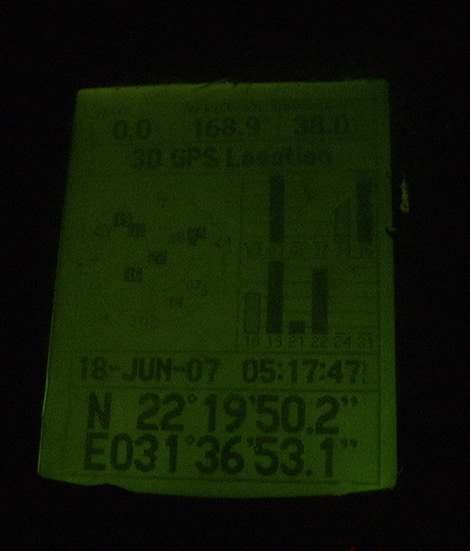
Latitude Longitude position taken at Abu Simbel
Then, at the 11th hour as I was about to be taken to either Aswan or Cairo for further questioning, the unbelievable happened. The fax machine in the next door room began whirring and spat out a two page letter written in Arabic with the official seal of the Ministry of the Interior splashed across the top. It was my permission authorization finally come through from Cairo! I cannot deny that I almost burst into tears with gratitude at what can only be explained as providential intervention and an incredibly fortuitous time.
This is a very quick update I'm afraid, to be followed by a more in-depth account, supplemented by photos and video footage (now returned) in a few days. Sher and I are heading out of Abu Simbel in a few minutes to try and bike to Aswan. Again this will involve a healthy dose of luck if we get through: the police in Aswan have refused us permission to ride the 287 kms, and there are at least four check points along the way. So we are leaving under cover of darkness again and hope to be able to bluster our way through, expedited by baksheesh if necessary. Or we night have to take a detour into the desert to skirt around the checkpoints if the front door approach doesn't work.
Will update more soon...
Huge thanks to all who have recently pledged money to the Moksha shipping fund, which has now been reached! MANY THANKS EVERYONE!!!
jason
** MOKSHA SHIPPING TO EUROPE FUNDING DRIVE - NOW CLOSED!!**
> Total to raise: $4,500
> Total raised to date: $4,700
> Total still to raise: $0
Sincerest thanks to the following for your pledges -
- "We didn't want to be forgotten", UK, $550
- Keith Jacko, USA, $50
- The Speed Family UK, $150
- Karen Bossen, USA, $50
- Wendy Bumgardner, USA, $50
- Will Waller, Dublin, $100
- Casey Dunn, USA, $100
- Anonymous, USA, $250
- The Sheltons, UK, $1,000
- Michael Rawlings, UK, $50
- Crister Brady, US, $50
- Karl Kaseoru, US, $500
- John and Bridget Maxwell, UK, $50
- Jennifer Mackenzie, US, $50
- Ian McCormick, UK, $200
- Terry Mason, California USA, $200
- Jackie and Jean Bernard, Djibouti, $250.
- Erden Eruc and Nancy Board of Around n Over, Seattle USA, $250
- Sharon Kessler, Colorado USA, $500
- Jane Koca, San Jose USA, $50
- John Caldwell, San Jose USA, $100
- Greg Kolodziejzyk of Pedal the Ocean, Canada, $250
Posted at 1:49 PM
June 19, 2007
Kayaking Lake Nasser. Day 3 - Success & Betrayal
Click on image to play video (high speed connection advised).LOCATION: 3 nautical miles south of Abu Simbel - Egypt
SEE WHERE WE ARE!
Longitude: N:22deg.19'50.
Latitude: E: 031deg.36'53.
Kms from Djibouti: 3,392 kms
The precautionary decision to bail from my hideout earlier yesterday afternoon was either been a well-judged one that kept me from premature capture by the authorities or a paranoid one made completely out of proportion to the real likelihood of being caught. I will never know the truth of course, but the events of the last two days since have convinced me that it was definitely the right thing to do. Very often in such situations one's gut makes the right decision.
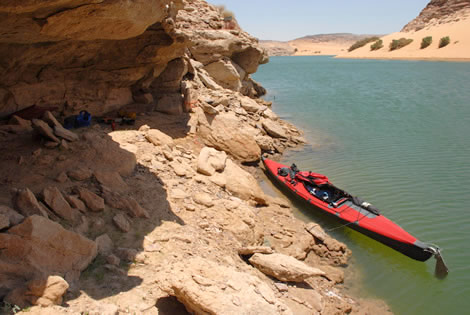
By 8.30 pm the light had faded sufficiently to allow continue paddling northward to my goal of Abu Simbel. It is here that a sealed road begins again all the way through to Europe. If I could just get to Abu Simbel, I was one [big] step closer to completing the circumnavigation. But if I was caught beforehand, even just a few hundred yards before making landfall, the only choice would be to backtrack thousands of miles to Mumbai in India (where Sher and I had started pedaling across the Arabian Sea in Moksha back in late February) and pursue an entirely different route to Europe via Pakistan and Iran: thousands of extra miles and thousands of wasted dollars - all over a piddly little bit of water. But unfortunately a crucial piddly little bit of water to complete by human powered means in order to ensure a legitimate circumnavigation. So much rested on this final night.
My strategy for kayaking has been to paddle for 2-3 hours, then try and beach the boat so I can get out for 10-15 minutes to rest my arms and shoulders, and to get some circulation back into my rear end (the seat that came with the folbot is a fairly basic one without gel padding). Night paddling can be quite tedious also, especially without a moon, so I find frequent stops are essential for staying awake (something illustrated to me the previous night when I capsized after falling asleep!) and having short term psychological carrots to look forward to. At around 1.30 am I stopped for 45 minutes to cook up a proper meal of pasta and veggies. It must have been on this occasion that I unknowingly picked up a stowaway that was to wreak havoc a little later into the voyage...
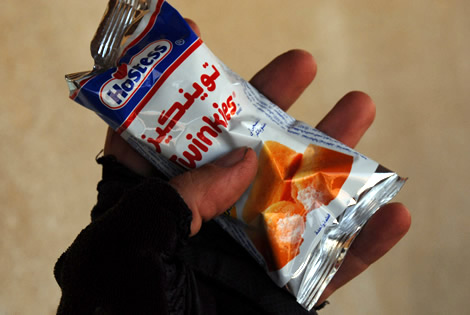
It was about an hour later, as I was plugging forward motivated by Twinkies and Green Day, that I felt something start crawling up my left leg. I knew instantly what it was: the idea of a large, no doubt poisonous, arachnid slowly ambulating its way over my skin is something I have had terrible nightmares about ever since I was a child. I'm not wild about snakes, but I can deal with them. And I don't mind scorpions or most other creepy crawlies. But when it comes to the 8-legged cousins I just want to run away screaming like a hair-dresser - ask my mother. So imagine my utter horror at not only having one of these things crawling up my leg, but there being very little I could do about it because of the kayak skirt (a waterproof shield that stops waves from sloshing into the cockpit) preventing me from flicking it instantly away. I tried to push it off with my knees but this turned out to be a bad idea - the wretched thing promptly bit me! I couldn't take it anymore. I dropped the paddle in the water (a potentially disastrous thing to do if I were to lose it), ripped away the velcro seal of the skirt as fast as I could, and managed to grab the thing and throw it overboard before it helped itself to another mouthful.
Fortunately I don't think it actually injected any venom as the pain remained local to below the knee and started to wear off after only 30 or so minutes.
By 4 am I reached the last GPS waypoint on the east side of the lake before crossing over to Abu Simbel; the glittering lights of the harbour by now clearly visible directly to the north (see video above). Another hour of paddling and the nose of the boat finally touched the shoreline of Abu Simbel. But there was no time to lose: even at 5.15 a.m. the faintest suggestion of milky grey light was fading in from the east. People would start getting up and about from anytime now onwards and the chances of being seen were increasing by the minute.
Until just a few hours previously I had been wrestling with a decision to either end the voyage in Abu Simbel and try making it to Aswan to clear Egyptian immigration, or paddle back to Wadi Halfa in Sudan, undetected of course, and take the ferry to Aswan on the 20th. The advantage of the latter was that the Sudanese authorities would give me an exit stamp in my passport (even if they didn't believe my story of paddling around in circles outside Wadi Halfa for 5-days), which would mean a clean and hassle-free entry into Egypt. In the former scenario I would present myself to the immigration authorities in Aswan (287 kms to the north), assuming I was even able to get there without having to show my passport at the police checkpoints along the way, and hope they would overlook the fact I had no exit stamp from Sudan. Awkward questions would inevitably follow, and possible deportation back to Sudan: more time, more money, and still the dreadful prospect of having to backtrack to India. I decided therefore to take plan B and keep things clean.
However in order to catch the ferry in time I would need to paddle during daylight hours as well as the night. Now that I had reached Abu Simbel I considered this to be an acceptable risk. Even if I was caught now I had achieved the primary goal of reaching the sealed road. So after a few hours rest in a perfect hideaway cave in the convoluted folds of an inlet system just a mile south of town (see video above) I began the return journey towards the border along the west side of the lake.
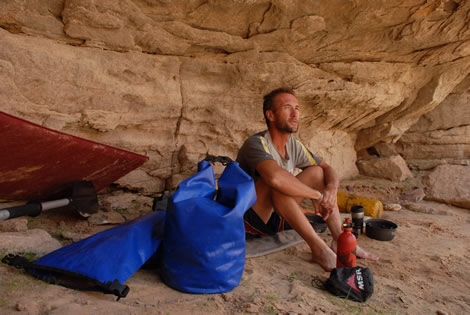
By 4 pm I was making good progress with a light breeze to the boat's starboard stern quarter. But, just as I was thinking how well things were turning out, I heard the sound of a motorboat fire into action from an island about a mile to the north. The boat seemed to be heading straight for my position and I could make out three people on board. My luck was about to change, and deep down I knew it wasn't going to be for the better.
As the craft drew closer I could make out that it was a fishing boat, surely not something that the authorities would use? But you never know. The thing that put me on edge however was the island they had come from: there were two semi-permanent looking buildings on the south facing slope. All the other shelters I'd seen on the lake (mainly south of the border in daylight) had been make-shift structures made from sticks and palm fronds. I wondered if these were perhaps fishermen who were also employed as observers by the border forces?
As the boat pulled alongside a short stubby man in a dirty red t-shirt began flailing his arms around like a windmill, shouting in arabic and pointing to the south. I could make out the word for 'kabir', meaning big, and a word that sounded coincidentally like 'fish'. Was he saying there was a big fish waiting to swallow me up if I continued? Or perhaps he meant crocodile? I offered the arabic translation for crocodile and this seemed to strike a cord with him. "Yes, Yes, timsah kabir, timsah kabir!!!". More excited gesticulating. A very unlikely story I reckoned, but perhaps they think I'm a dumb tourist completely lost and they're doing me a favour by trying to stop me? Then he mentioned the word 'police' in his wild jabberings, crossing his forehands in the sign of someone being arrested, then jabbing a fat sausage-like finger towards the south. Does he know something I don't? Perhaps there's a patrol boat waiting around the corner that he's trying to warn me about? Or, as my original instinct suggested, it's all an elaborate ploy to turn me in? All of these possibilities whirled around in my head in confusion as I desperately tried to decipher what was really going on. One of the three then took a hold of the front of my boat and they began trying to tow me back to the island. At this point I delved into my camera bag (the guy in the red shirt recoiled initially as I thought I was pulling a gun!), and turned the video camera on them, just so they knew that the events were being recorded for possible future accountability if things turned sour. They subsequently freed my boat and I decided to err on the side of caution by following them to land, give it half an hour to try and pick up more clues as the reality of the situation, then head off.
On the island I was offered tea in one of the huts while two of them took a boat out fishing. Or at least that's what the guys who stayed behind would have me believe. What they were really doing was going out into the middle of the lake where there was mobile phone reception so they could call the security forces in Abu Simbel. Not realizing this (until it was too late) I decided to hang out for 45 minutes until around 6 pm, then paddle off and if necessary just poodle around the surrounding area until it was dark enough to continue south. This way even if there was a patrol boat waiting down the coast I could slip past it undetected. But I didn't want to spend any more time here than was needed to gather information. There was a definite uneasy energy in the air. Plus their fishing camp was littered with refuse and the smell quite overbearing.
Time slowly ticked by and barely a word was uttered even between themselves, let alone to me. Something was definitely not right. By a quarter to six I had had enough and stood up to head down to my kayak. At once the rest of the gang stood up with me and followed me out of the shelter. I told them I was leaving (not that they understood a word) and thanked them for the tea and the incredible hospitality they'd displayed (?!?). As we neared the water's edge I could make out the faint sound of an outboard motor approaching from the north. I quickly picked up my paddle and continued walking faster now towards the kayak. Suddenly I felt two sets of hands on either of my upper arms. I shrugged them off in irritation and continued walking. The hands came in again, this time with a much firmer grip. When I tried pulling away again a struggled ensued and the whole mob pounced on me and flattened me on the ground with a pair of knees pinning me in the small of the back just below my kidneys. I knew at this point that I had been betrayed and the sound of the motor was the security forces coming to arrest me. I should have listened to my original intuition when I first saw them coming towards me on the lake and just carried on. Although ironically it would later transpire that they were actually doing me a favour by not having to paddle all the way back to Sudan (see next report).
A short while later I was hauled to my feet and a smallish white boat (perhaps 4 metres) with three plains clothes army personnel came to a halt beside me on the beach. The commanding officer, a pock-mark faced man of around 35 years old masked behind aviator-style sunglasses, had his firearm drawn and ready to use. Quick verbal exchanges between the fishermen and army guys (who turned out to be with Army Intelligence) followed, the former no doubt over-dramatizing their side of the story to try and increase the value of their reward. I just went along with the whole thing as at this point I had little to gain by either resisting arrest or being difficult. The main thing was to impress upon the CO that I was just a dumb tourist who had wandered astray and not a covert operative working for a foreign government - something that would only be clarified 36 hours later at their detention centre in Abu Simbel.
With the kayak loaded into the launch we took off back towards Abu Simbel with the light now fading past. The fishermen looked so happy with themselves I felt I should say or do something to wipe the smiles from their faces. But I decided to kept my mouth shut for a change. I didn't want my new captors thinking that I knew I was actually in the wrong. Plus I actually felt a little sorry for these guys living all the way out here in this barren wilderness on their polluted island covered in their own rubbish. Who knows, perhaps they were a microcosmic example of things to come for the entire human species if we don't curb the rapacious pace at which we are using up the planet's resources? Guinea pigs in a field experiment to determine the likely outcome of life on earth?
A useless string of related thoughts quietly bubbled into my mind rather than preparing mentally for my impending interrogation through the night. Strange how reflective one can become when in BIG trouble...
jason
Posted at 12:48 PM
June 17, 2007
Kayaking Lake Nasser. Day 2 - A Near Miss
Click on image to play video (high speed connection advised).LOCATION: 7 nautical miles north of the border - Egypt
SEE WHERE WE ARE!
Longitude: N:22deg.07'24.
Latitude: E: 031deg.26'13.
Kms from Djibouti: 3,362 kms
I came-to with a start, the cold water engulfing my head and upper body, waking me instantly. For a split second I was completely disorientated: 'Where the hell was I and why was I trapped with my head underwater and in complete darkness?' Panic quickly set in as I wrestled to free myself from the obstruction that was preventing me from gaining breath. Then I remembered: I was in a kayak, paddling across Lake Nasser in pitch darkness over the border between Sudan and Egypt. I'd apparently fallen asleep in the early hours of the morning while paddling and capsized.
As I gathered my wits and ripped the kayak skirt away from the cockpit, enough to free my legs and catch a breath, my thoughts quickly turned to crocs. Nile crocodiles are notorious in the lake (hunting has been outlawed for sometime) and typically outgrow their saltwater cousins from Down Under by as much as 20%. I'd seen one the previous day while paddling north from Wadi Halfa - just a quick glimpse of a brown snout taking a largish fish at the surface - but enough to remind me that spending any length of time in these waters is potentially bad for the health.
Fortunately I'd been shadowing the eastern shoreline close to a clutch of small islands when I'd capsized, so rather than trying to pump the boat out while treading water and going through the difficult procedure of getting back into the kayak solo, I was able to swim to shore with the mooring rope in my mouth and complete the operation with the luxury of my feet on dry land.
By 5.15 am enough light was creeping into the eastern sky to be able to start looking for a place to hideout for the day, until being able to resume the expedition the following evening under cover of darkness. I needed enough cover to hide myself, the kayak and the tent fully erected with tarpaulin rigged for shade. I knew this wouldn't prove easy seeing as the shoreline both sides of the lakes was quite barren: just rocks, sand and occasional evergreen shrubs and bushes strangely suffocated by spider webs. And I had a tight timeframe to not only find a suitable location but also to unload the kayak and drag everything up the beach away from the prying eyes of villagers, fishermen or sheep herders who would be up and about from sunrise (6 am) onwards.
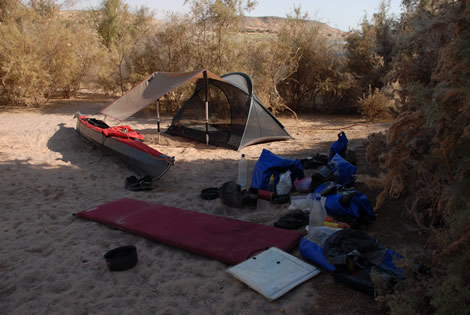
The one major asset the edge of Lake Nasser has for this kind of activity however is how convoluted it is: a labyrinth of tiny islands, inlets and coves lead away from the main lake making it possible to disappear from view very quickly. Within 10 minutes I'd found a perfect spot hidden behind a double row of bushes and with a steep cliff face to the rear so that only by standing on the top of the island looking down the cliff face in exactly the right direction would someone be able to see me. I felt confident that I could rest here during the heat of the day without detection. How wrong I would prove to be!
I cooked a meal then slept until 12 when the sun became too hot. A few hours later a herd of sheep drifted in nearby and the shepherd boys charged with their care seemed far enough away not to pose a problem. But as the afternoon wore on the sheep came closer and closer, and I held my breath as one of the boys broke through the barrier of the bushes just 30 feet away in order to take a pee. He turned to head back the way he'd come and for a split second I thought he hadn't seen me. But his peripheral vision must have picked up the incongruous shape of my tent and kayak. He threw the quickest of glances in my direction then hurried back to share the discovery with his friends.
Five minutes later my campsite was invaded by no less than 5 visitors (see video) who came traipsing through the bushes to say hello and ogle at the kayak. My cover was now blown and I was in a quandary as to what best to do. The older men stood with their arms crossed seemingly musing at the situation and considering what action to take. I couldn't understand a word they were saying of course but their body language spoke of distrust and betrayal. They left abruptly with one of them raising his hand to his temple in the international sign language for making a telephone call. I resolved to move my position as quickly as possible in case they tried to call the authorities. Within an hour I was back in the kayak and paddling further into the myriad collection of islands available for temporary obscurity until darkness fell.
jason
Posted at 10:29 PM
June 16, 2007
Kayaking Lake Nasser - To the Border (Day 1)
Click on image to play video (high speed connection advised).LOCATION: 12 nautical miles north of Wadi Halfa - Sudan
SEE WHERE WE ARE!
Longitude: N:21deg.54'27.
Latitude: E: 031deg.16'38.
Kms from Djibouti: 3,336 kms
For the past 24 hours I've been camped on a small island 12 miles north of Wadi Halfa and just 6 miles south of the border with Egypt. My departure from Wadi Halfa late yesterday morning was spur of the moment prompted by an expected turn of events. Earlier in the morning I'd been informed by Mazar (brother to Midhat Mahir in Khartoum and my local fixer in Halfa) that the Sudanese Security had now refused me permission to even paddle to the border and back: my last resort plan in the event that permission from Cairo didn't come through and I was forced into a band-aid solution of picking up from the Egyptian side where I'd left off on the Sudanese side (having taken the ferry in between). Not a very clean way to do it, but acceptable to keep the human-powered thread intact and certainly better than having to backtrack all the way to Mumbai in India.
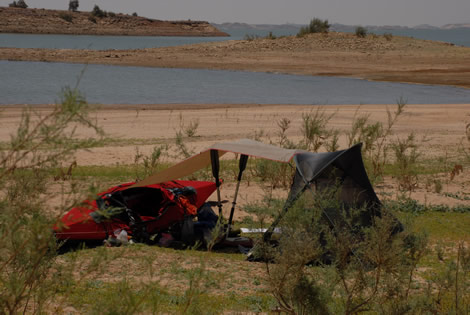
On hearing the disappointing news I sat on my bed in the 'Deffentoad Hotel' and considered the options available: my Sudan visa had run out by almost a week and the authorities would certainly stick me on the next ferry to Aswan in Egypt due on the 20th, leaving just 4 days for the permission to come through from Cairo. This seemed unlikely to happen given how nothing further had been heard back from the Egyptian Embassy in Khartoum since their initial request for further information several weeks ago. And if I was forced onto the ferry without kayaking at least to the border, then it would certainly mean backtracking all the way to India.
Mazar also seemed keen for me to stay close to the hotel so that Security could keep an eye on me. I was beginning to wonder if Mazar was working more for the authorities than for me! I knew he was in a difficult situation though, having been brought up in this town and knowing all these guys personally. And as he said himself, it was proving harder and harder to find a legitimate 'solution' for me. It was therefore time to take matters into my own hands. I've learnt over the years that often in places like this when you ask official permission to do something you actually create a more of a problem than if you just go ahead and do it: no one wants to take the rap on anything if things goes wrong. However the stakes on this jaunt would be a little higher than usual in so much as I was crossing an international border without permission from either side and the likelihood of getting shot was not that unrealisti - crossing in a clandestine-type craft and at night.
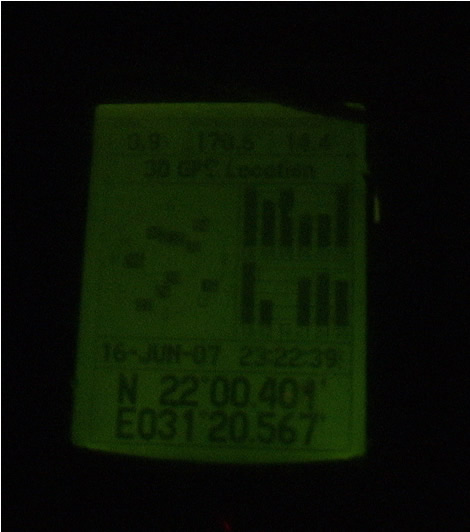
So I told the hotel staff that I was going out for a few hours for a spin in the kayak, pre-paid for two nights so as not to arouse suspicion, locked the door and did away with the room key.
What a wonderful feeling it has been actually getting going! Just paddling on the lake to my campsite here completely rejuvenated my spirits after spending so many days waiting in Wadi Halfa on the whims of others. The 5 hr paddle to cover the 12 nautical miles has given me a proper chance to try out the kayak and in some higher wind conditions (the wind always blows in the afternoon). Although excellent in many of its design qualities the Folbot does let in water in waves over 1.5 feet (via the ill-fitting velcro seals around the cockpit mainly I think), so I'm very glad I went to the trouble and expense of sending a bunch of dry bags from Djibouti to protect the electronic gear from getting wet.
I've taken the liberty of staying on this little island for a full 24-hour cycle: to observe the weather conditions (particularly at night); the clarity of the stars for celestial navigation (I don't want to turn on my head torch at all to read the compass while crossing the border area), and amount of moonlight available both for kayaking and for the observation posts to detect me in silhouette form, and the likelihood of the north wind slackening during the evening making northward progress easier. Once I push away from shore tonight I will only have one shot at getting it right, and I want to make sure that I make good enough progress to be well away from the border observation posts by first light.

My plan is to push off at around 8 pm, taking a couple of hours to paddle the 6 miles to the border post of 'Argin' on the west side of the lake. By the time I reach there it should be completely dark, the moon having dipped below the western horizon, allowing me to head for the middle of the lake for actually crossing the 22 degree line of latitude (the border). Sticking to the middle of the lake should give me between 1 and 2 miles of clearance between observation posts. North of the 22 degree line I enter into unknown territory as far as what additional observation points they have and the patrol vessel I've heard the Egyptians use to patrol the lake with (with infrared capability for night time surveillance?). I'll look to paddle until about 5.15 am, just as first light is appearing in the eastern sky, using the faint light to locate a suitable hideout for the day. I need to be completely hidden by 6 am when people start getting up and about.
jason
Posted at 4:33 PM
June 14, 2007
LOCATION: Wadi Halfa, northern Sudan
LOCATION: Wadi Halfa, northern Sudan
SEE WHERE WE ARE!
Longitude: N:21deg.48'00.
Latitude: E: 031deg.20'56.
Kms from Djibouti: 3,213
Still no word from the Egyptians, just a request for 'more information', which they already have. I'm beginning to lose hope that they're going to give me permission to paddle across the border. Every morning at 11 o'clock I call 'Hadija', the personal assistant to the Egyptian ambassador, to see if there's been word back from Cairo. Each time I am put on hold and the same merry-go-round music played on a cheap synthesizer comes on the line, which is apt seeing as that all I'm getting from them is the merry-go-round treatment. Each time Hadija comes back on the line and tells me there has been no response. Hrummph.
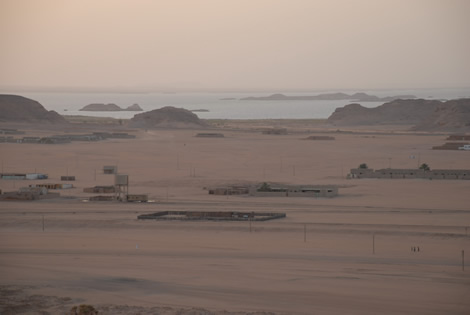
I've even modified my request to paddle just to Abu Simbel, a mere 40 miles north of Wadi Halfa, then continue by bike on the sealed road from there up to Aswan. This way they don't have to provide an escort boat for the 2.5 weeks it will otherwise take to paddle the entire lake. But I don't think it really makes a difference at this point. Perhaps they're just stalling in the hope that I'll just give up and go away.
Which after 13-years isn't going to happen. They don't realize it of course, but they've put me into an impossible situation where I have to give it a go regardless. I've given them 3-weeks to give a response, a reasonable amount of time I believe for anyone to make up their mind on anything. And now my visa for Sudan has expired, so I'm in Sudan illegally. The attractions and distractions that Wadi Halfa have to offer dried up within an hour of arriving here, so don't think I can stay here for too much longer before either A. Sudanese immigration kick me out anyway or B. I lose my mind waiting in this torpid town.
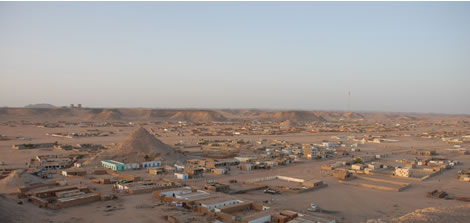
I have thus resolved to leave tomorrow morning to paddle at least to the border, 12 nautical miles to the north. Mazar Mahir, the well-known local fixer, has made arrangements with the Sudanese security so at least they know what I'm up to on this side of the fence. In an ideal world I'd then zip up to Abu Simbel and back again under cover of darkness, and without the Egyptians catching me. But the reality of what happens will depend largely on how closely I am tailed by the Sudanese security boat, and how observant they are on the 22 degree line of latitude: apparently there is an Egyptian observation post located one side of the lake, facing a Sudanese post on the other. Both sides watch each other and of course the lake in between.
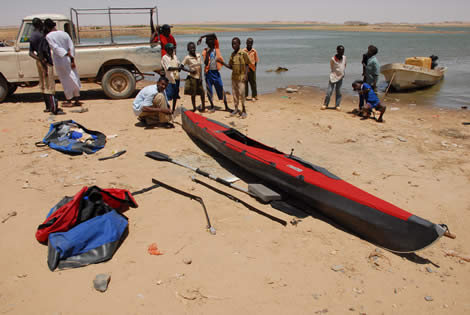
The folbot kayak and all the gear are ready to go. Mazar and I set it up on the lake shore the other day and took it out for spin. I have 10-days worth of supplies ready. Water can be taken straight from the lake and drunk with iodine droplets. My bike plus associated kit have already gone ahead to Aswan on yesterday's ferry with some folks I met here a few days ago: Tom Wilson, a Brit, on his way home after backpacking up from Cape Town; and Kurt and Dorothy, a Swiss and German respectively, also cyclists who have been on the road for 9-years having ridden over 140,000 kms through all the major continents, now on their way home to Cologne to look after Dorothy's elderly parents. I am very grateful to all of them for helping out. Ditto to Mazar and Midhat Mahir who have been so helpful here in Sudan with logistics.
jason
** MOKSHA SHIPPING TO EUROPE FUNDING DRIVE **
> Total to raise: $4,500
> Total raised to date: $4,050
> Total still to raise: $450
Sincerest thanks to the following for your pledges -
- Karen Bossen, USA, $50
- Wendy Bumgardner, USA, $50
- Will Waller, Dublin, $100
- Casey Dunn, USA, $100
- Anonymous, USA, $250
- The Sheltons, UK, $1,000
- Michael Rawlings, UK, $50
- Crister Brady, US, $50
- Karl Kaseoru, US, $500
- John and Bridget Maxwell, UK, $50
- Jennifer Mackenzie, US, $50
- Ian McCormick, UK, $200
- Terry Mason, California USA, $200
- Jackie and Jean Bernard, Djibouti, $250.
- Erden Eruc and Nancy Board of Around n Over, Seattle USA, $250
- Sharon Kessler, Colorado USA, $500
- Jane Koca, San Jose USA, $50
- John Caldwell, San Jose USA, $100
- Greg Kolodziejzyk of Pedal the Ocean, Canada, $250
Posted at 5:42 PM
June 10, 2007
A Windfall in the Desert & arrival Wadi Halfa
LOCATION: Wadi Halfa, northern Sudan
SEE WHERE WE ARE!
Longitude: N:21deg.48'00.
Latitude: E: 031deg.20'56.
Kms from Djibouti: 3,213
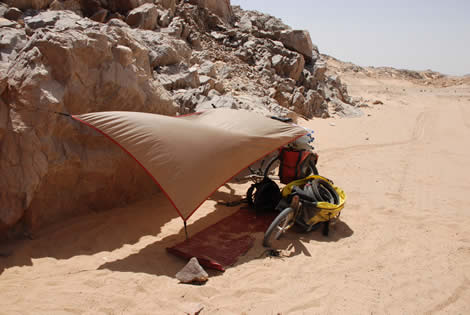
The last day to Wadi Halfa was probably the toughest day's biking I've ever had. Aside from the terrible road conditions a sandstorm blew in early afternoon from the north, pinning me down in a particularly remote section where there was no shelter and all I could do was huddle behind the bike and block my nose and ears with my fingers to stop them getting filled with sand. For the remainder of what turned out to be a 14-hour day in the saddle the wind blew continuously at 25+ mph exclusively from the direction I was trying to go in. At one point my speed was so slow (average for the day - 4.5 mph) that I seriously considered hiding the bike plus panniers behind a pile of boulders and walking the rest of the way to Halfa, returning later with a vehicle of some sort to retrieve the gear. Anyway, I'm now safely in Halfa with the last of the bad African roads behind me, Hamdulilah!
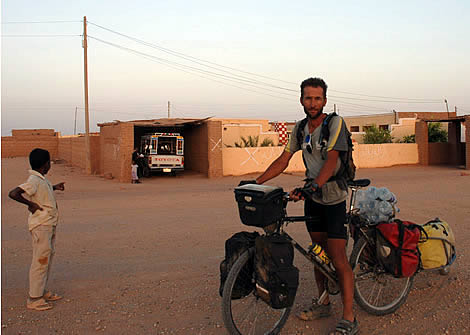
The only people I saw on this last stretch from Abri were the British actors Charlie Boorman and Ewan Mcgregor plus production team en route south on their latest Long Way Down expedition by motorcycles from northern Scotland to Cape Town. We crossed paths on the most remote section of the desert highway where at most you'd expect to see a lorry carrying locals to or from Halfa. So I don't know who was more surprised to see who! Myself to encounter this huge entourage of support vehicles and camera crews in tow, or Charlie and Ewan to see this lone bicyclist in a desert region where people never usually travel alone or unsupported because of the extreme heat, lack of water and possibility of attack from wild animals (which the locals assure me are out there).

They too were finding the tough going. Since leaving Halfa the previous day they'd broken two sets of rear spring suspensions, putting one of the bikes out of action. When I told Ewan he could expect similar road conditions for the next 600+ kms he pursed his lips and said nothing.
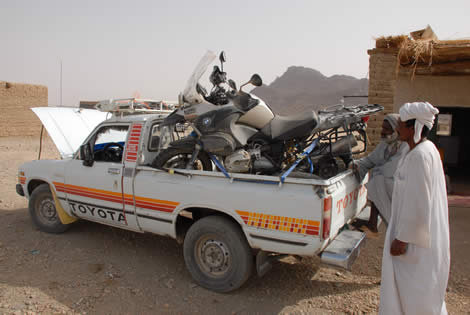
Before parting ways the producers made a very generous cash donation of a thousand pounds to the expedition that will help to cover the satellite airtime costs associated with updating this blog. Even they too have found it excruciatingly difficult to procure sponsorship from the UK. When I told then that we'd been trying to get financial backing from the UK for 13-years but without success, I think they felt bad and reached into their emergency fund to share their budget a little. It's ironic that the largest contribution we've received from a single UK source has been another expedition!
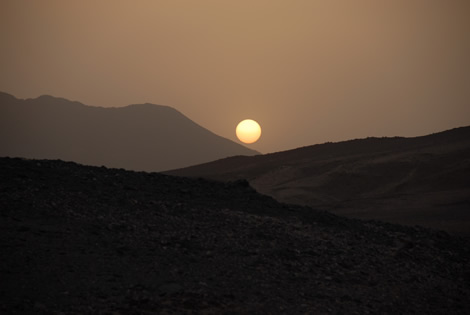
Wadi Halfa is the end of the road for Sudan. From here people usually take the weekly ferry up to Aswan in Egypt, 200 miles to the north across Lake Nasser. I am looking to cross the lake by a canvas folbot kayak shipped up from Khartoum. Later this afternoon I'll take it down to the lake and give it a test run to make sure there's been no damage in transit. Meantime my friend Midhat Mahir in Khartoum has been liaising with the Egyptian embassy to arrange for the necessary permission to cross by kayak into Egypt. The powers that be in Cairo have given the tacit go ahead to being able to cross the border, and yesterday asked for specific details such as my exact routing, date of crossing into Egypt and whether there was a film crew following along. So I'm interpreting all this to mean that there's a very good chance something will happen. I've asked to cross over on the 12th, giving a couple of days to catch my breath and prepare for water born travel again.
jason
** MOKSHA SHIPPING TO EUROPE FUNDING DRIVE **
> Total to raise: $4,500
> Total raised to date: $3,950
> Total still to raise: $550
Sincerest thanks to the following for your pledges -
- Will Waller, Dublin, $100
- Casey Dunn, USA, $100
- Anonymous, USA, $250
- The Sheltons, UK, $1,000
- Michael Rawlings, UK, $50
- Crister Brady, US, $50
- Karl Kaseoru, US, $500
- John and Bridget Maxwell, UK, $50
- Jennifer Mackenzie, US, $50
- Ian McCormick, UK, $200
- Terry Mason, California USA, $200
- Jackie and Jean Bernard, Djibouti, $250.
- Erden Eruc and Nancy Board of Around n Over, Seattle USA, $250
- Sharon Kessler, Colorado USA, $500
- Jane Koca, San Jose USA, $50
- John Caldwell, San Jose USA, $100
- Greg Kolodziejzyk of Pedal the Ocean, Canada, $250
Posted at 10:23 AM
June 6, 2007
All Roads lead to Halfa (eventually)
Click on image to play video (high speed connection advised).LOCATION: Abri , Northern Sudan
SEE WHERE WE ARE!
Longitude: N:20deg.48'21.
Latitude: E: 030deg.20'51.
Kms from Djibouti: 3,021
The 'road' (if it can even be called that) leading north from Dongola to Wadi Halfa is worse than I anticipated. If it's not deeply rutted sand, the surface of any one of numerous tracks snaking through the desert is severely corrugated and a nightmare to ride on a bike without suspension. My daily speed has dropped to single digits for most of the time, averaging out to just over 10 kmph (6 mph). And it's not been possible to travel at night because of the need to constantly be seeking out the best surface to ride on, so it's back to sweating it out during the daylight hours. But enough said about the heat!
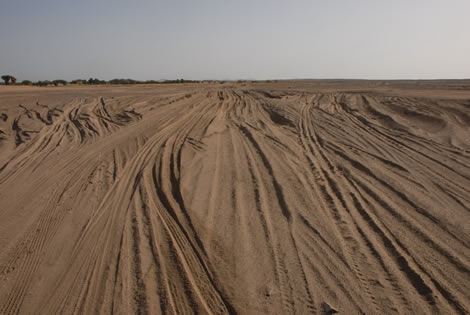
The one saving grace, at least until now, has been the presence of the Nile which I always keep within sight to my left side. Once I took a wrong turn and ended up tearing off in completely the wrong direction into the desert following telegraph poles instead. Before long I felt a strong sense of emptiness and absence of the safety net provided by the strip of green lining the river. A GPS fix married to the topo map soon but me back on track. But it was a mistake I have not allowed myself to repeat: the desert is not a place for mistakes.
The hospitality of the local Nubian people has also helped to offset the rough conditions. Often when I stop at one of the small roadside shelters housing clay pots filled with river water I will be offered food, tea and a mat to crash out on for a while. This has really made a difference in the heat of the afternoon when I find myself aiming to ride increments of just 10 kms before collapsing for a rest. This pattern will change on this next section however: the last 180 kms from here to Wadi Halfa where villages become fewer and fewer as the road veers into the desert. So I'm resting here in Abri this morning of the 6th before continuing later this afternoon for the final push, expected to take a further 3-days.
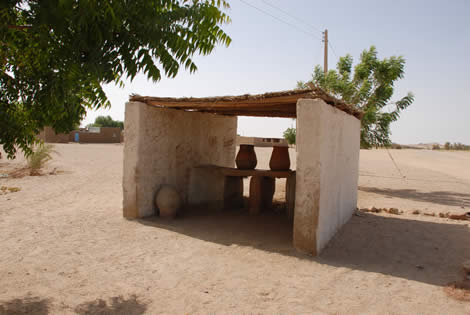
I've given up trying to filter the river-water as the membrane on my Katadyn water filter clogs too quickly. So I'm now just using iodine, which actually seems to be agreeing better with my internal plumbing.
Crossing the Nile from the west to east bank ended up being quite the fun interlude to break up the desert slog (see video above). The point where I was looking to cross at Argo seemed too wide to swim - nearly a kilometre - with a swift flowing current and known crocodile haunt in the islands downstream. It was with great relief therefore that I discovered a small rowing boat nestled in the reeds. Made entirely out of beaten-out oil drums (even the oar blades cut from the lids!) it wasn't something I'd want to take on an ocean with, but it would certainly beat swimming across the Nile. A couple of mobile phone calls later the owner, a local fisherman called Osman, kindly came from his village (having just buried his Uncle that very morning!) and together we pushed off and arrived on the other side just 15 minutes later. When I handed him the equivalent of $25 US he initially refused, saying it was way too much. "Just think of it as a life-insurance payment", I told him. "You very likely just save my life!"
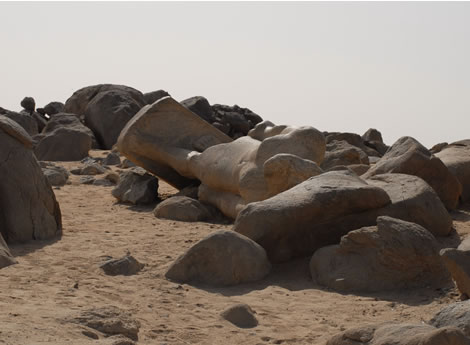
At a more sensible time of year, at least in terms of the climate, this is certainly a part of the world I'd recommend exploring by mountain bike either side of the river. Just north of Kerma near the village of Tombos I stumbled across an ancient granite quarry used by the early Egyptians to carve statues for the nearby temple built by Thutmose I to commemorate his conquest of Kerma in late 15th century BC. And further north on the west bank a few weather beaten columns are all that remain of the temple of Soleb, built by Amenhotep III in the 14th century BC, similar in design and build apparently to the Temple of Luxor in Egypt. It still amazes me that these ancient artifacts are just lying about uncared for in the desert being used as little more than scratching posts for sheep and goats. Maybe one day, when it's too late, the Sudanese government will wake up and realise what an incredible historical legacy they've allowed to dissolve into dust.
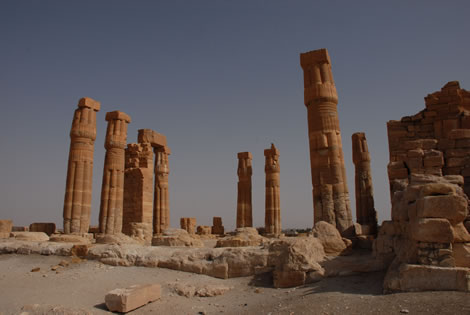
Regarding getting permission to cross Lake Nasser: I did have a conversation with the Egyptian ambassador in Khartoum the day before yesterday and he expressed sincere interest in the expedition and promised to follow up personally with the Ministry of Tourism in Cairo. So I feel quite positive about the outcome of this, knowing that my request letter hasn't just disappeared under a pile of paperwork.
jason
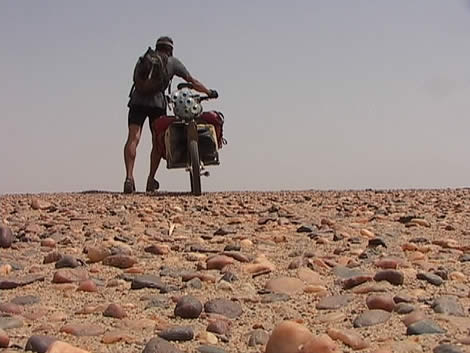
MORE IMAGES (click to enlarge)



** MOKSHA SHIPPING TO EUROPE FUNDING DRIVE **
> Total to raise: $4,500
> Total raised to date: $3,750
> Total still to raise: $750
Sincerest thanks to the following for your pledges -
- Anonymous, USA, $250
- The Sheltons, UK, $1,000
- Michael Rawlings, UK, $50
- Crister Brady, US, $50
- Karl Kaseoru, US, $500
- John and Bridget Maxwell, UK, $50
- Jennifer Mackenzie, US, $50
- Ian McCormick, UK, $200
- Terry Mason, California USA, $200
- Jackie and Jean Bernard, Djibouti, $250.
- Erden Eruc and Nancy Board of Around n Over, Seattle USA, $250
- Sharon Kessler, Colorado USA, $500
- Jane Koca, San Jose USA, $50
- John Caldwell, San Jose USA, $100
- Greg Kolodziejzyk of Pedal the Ocean, Canada, $250
Posted at 7:01 AM
June 1, 2007
Moon Cycles
Click on image to play video (high speed connection advised).LOCATION: Dongola, Northern Sudan
SEE WHERE WE ARE!
Longitude: N:19deg.10'24.
Latitude: E: 030deg.28'06.
Kms from Djibouti: 2,750
The scrubland north of Khartoum has now given way to a desert landscape devoid almost entirely of vegetation (apart from the oases surrounding the water-holes) and dominated by never ending horizons of sand. By day this environment becomes extremely inhospitable: even by 8 o'clock in the morning the temperature has reached uncomfortable levels. But at night the desert comes into it's own, at least for my purposes: cooler temperatures; a flawless sky crammed with enough planets and stars to spend a lifetime of space-gazing; and of course the moon at centre stage, tracking slowly but inexorably across the heavens.

The day time temperatures are so harsh that I have adapted to a routine centred around the night. After laying up in shade for the best part of the afternoon I start my biking day at around 6 pm, ride until 2-3 in the morning, grab a few hours sleep in the sand by the side of the road till dawn, then ride as long as I can before my forearm starts to smell like roast pork. By 11 am I'll start looking for a flood tunnel under the road or a shade tree to escape from the heat: imagine opening the oven door and sticking your head inside with the dial turned up full - that's what it feels like trying to ride after midday.
As well as being cooler the night is also the only time of day when the wind, that blows exclusively from the north (the direction I'm going in), dies down and I can actually make realistic progress. I consume much less water at night also, which means less weight to carry and less time filtering water from the roadside wells that (thankfully) line the route. During daylight hours I'm finding that 1.5 litres will buy me around 15 kms. At night this mileage is nearly doubled. Either way water is my overriding concern throughout the 24 hr day, and my daily intake is never less than 10 litres.
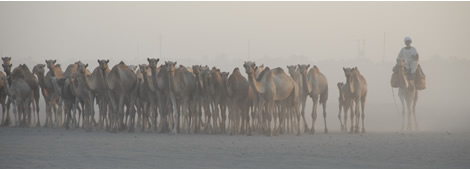
I can expect this figure to jump by at least 50% on this last, extremely rugged, section between Dongola and Wadi Halfa in the far north. This final 400 kms is going to be very tough: the 'road' will at best be gravel, but more likely sand most of the time requiring large sections where the bike will need to be pushed, further increasing the amount of water needed to be carried. And whether I'll be able to ride at night with such uneven and corrugated road conditions is unclear. So it could take up to 6 days to reach Wadi Halfa. Plus for the last 200 kms there are apparently no villages or wells, so I will look to carry up to 40 litres for this section alone.
I also need to swim across the Nile at some point to pick up the better road on the east side. So I'm counting on the legendary Nile crocodiles, which apparently make the salties in Australia look like bath toys, being too lazy in the heat of the day to bother with me.
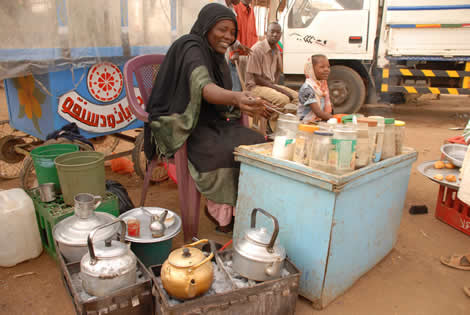
Roadside Tea Lady
Still no word from the Egyptians on permission to cross the lake. For those just joining the blog I am having to seek special permission from the Egyptian government to cross Lake Nasser between Sudan and Egypt. Currently the only way to cross the border is by the weekly ferry from Aswan to Wadi Halfa. They don't want anyone within 300kms of the border with Sudan for various reasons: the ongoing dispute over the Haleib Triangle on the Red Sea side, their concerns over security of their high dam at Aswan, and paranoia in general about tourists getting bumped off (like in Luxor 12 years ago) by radical extremists which in turns costs their tourism industry dearly. The ridiculous thing is there is actually a perfectly good road on the west side of the lake, which may be opened in the next 4 months, but in the meantime remains closed.

Here in Dongola I've splashed out on an room with AC for 24 hours to just give my body a break from the heat, re-hydrate with fluids and recoup in general for this final push. Words cannot describe how heavenly this feels! Although the capital of the country's Northern State Dongola has a super laid-back feel to it; presumably even the locals find it too hot to get worked up about much. Flushed with greenery from the date palms irrigated by Nile water it has the real feeling of an oasis in the desert, and fresh produce abounds in the market which is good news for restocking my panniers with fruits and veggies for this final stage. Dongola is also the hub of Nubian culture, renowned for it's hospitality and friendliness which certainly hasn't failed to disappoint. On my forays outside of the hotel people constantly come up and introduce themselves, inviting back to their homes to meet their family, or just inquiring as to my general well being and impression of Sudan. It's a blessing really considering how harsh the environment is here: knowing that I can flag down a vehicle (what few there are) or knock on a door if I get into real trouble gives some sense of a safety net.
Before signing off I'd like to wish Erden Eruc of Around n Over all the very best for the imminent next stage of his human powered circumnavigation: he's about to step aboard his rowing boat and spend 8-months at sea rowing across the Pacific from San Francisco to Australia.Check out his progress as he takes on this immense task.
jason
MORE IMAGES (click to enlarge)

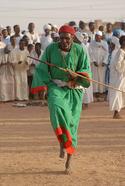
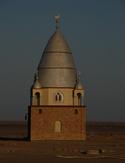
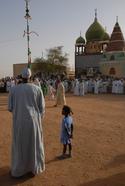

** MOKSHA SHIPPING TO EUROPE FUNDING DRIVE **
> Total to raise: $4,500
> Total raised to date: $3,500
> Total still to raise: $1,000
Sincerest thanks to the following for your pledges -
- The Sheltons, UK, $1,000
- Michael Rawlings, UK, $50
- Crister Brady, US, $50
- Karl Kaseoru, US, $500
- John and Bridget Maxwell, UK, $50
- Jennifer Mackenzie, US, $50
- Ian McCormick, UK, $200
- Terry Mason, California USA, $200
- Jackie and Jean Bernard, Djibouti, $250.
- Erden Eruc and Nancy Board of Around n Over, Seattle USA, $250
- Sharon Kessler, Colorado USA, $500
- Jane Koca, San Jose USA, $50
- John Caldwell, San Jose USA, $100
- Greg Kolodziejzyk of Pedal the Ocean, Canada, $250
Posted at 10:54 AM
